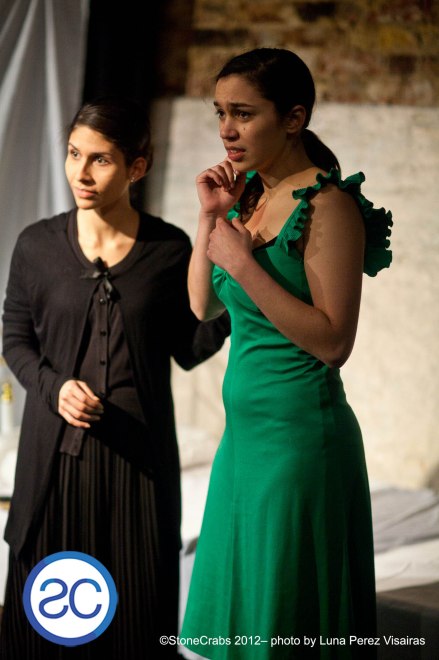Having only ever worked with new writing in my short time as a director, I thought my next play should be a ‘classic’ play – ideally a Shakespeare piece. As Shakespeare has been done so many times I was struggling to find the ‘right’ play, so Franko Figueiredo advised me to look at *The Marowitz Shakespeare – a book containing five Shakespearian plays that had been adapted in the 70’s by the Director and Playwright, Charles Marowitz.
Marowitz’s approach to Shakespeare was like no one else’s of the time: he removed characters, large pieces of text and played with the order of the narrative. Reading the book I found I was more drawn to the forward in which Marowitz talks about his approach and method to the plays, rather than the play themselves. This was when I decided to forget about finding the ‘right’ Shakespeare play and instead apply Marowitz’s method on a play of my own choice.

Adaptation of ‘The House of Bernarda Alba’: ‘A Mothers Will’, at Tara Arts Theatre. Anais Alvarado as Angustias, Terri-Ann Brumby as Poncia, Tereza Araujo as Bernarda and Danusia Samal as Adela
Still wanting to work with a piece of classic text I quickly remembered The House of Bernarda Alba by Garcia Lorca and thought it would be the perfect text to try this method on.
The next step from here was to copy the play out by retyping it into my computer. This process helped me in the past to pay more attention to the actual words on the page and also to the punctuation used by the writer. For this exercise it also had another use: it gave me a sense of ownership over the text and a copy that I could easily edit from.
Before I started cutting dialogue out I wanted to decide on which characters I was going to keep. The majority of the characters were pretty easy to cut, (such as the neighbors), but I also wanted to only have two sisters instead of five. As the main action concentrates on the older and younger sisters Adela and Angustias, it was quite easy to make that decision, however I didn’t want to loose the personality of the other three sisters, so I stole their back stories and personality (along with some dialogue) and combined them with the two sisters I was keeping. Along with the two sisters I only wanted to keep two more characters; Bernarda and the head maid Poncia. Bernarda I kept for obvious reasons but I thought Poncia was just as vital. She is the only character who is not a family member, is not scared to challenge Bernarda and, she is the only character Bernarda, very occasionally, opens up to.

Adaptation of ‘The House of Bernarda Alba’: ‘A Mothers Will’, at Tara Arts Theatre. Anais Alvarado as Angustias and Terri-Ann Brumby as Poncia
I spent a total of 5 months playing with the text and getting it to a point where I was happy to then start rehearsing. I think it is probably the most thorough I have ever been with a piece of text and it was a really enjoyable process. I have never had the luxury of time with past projects so it was huge learning curve being able to look at the whole play in such detail, rather than just thinking ‘how can I get this on!’
Since doing this project I will certainly look at each piece of writing in a very different way. Reflecting on the adaptation of The House of Bernarda Alba, which I entitled A Mothers Will, I think I could have been braver with my approach; I didn’t jumble up as much narrative as I possibly could have and I also regret not keeping Bernarda’s mother in the play as a silent part, which I think would have added a really interesting layer to the piece.

Adaptation of ‘The House of Bernarda Alba’: ‘A Mothers Will’, at Tara Arts Theatre. Anais Alvarado as Angustias and Danusia Samal as Adela
That being said, this process has encouraged me to start writing more of my own scripts and to continue with this new process of approaching plays. I’m also not quite finished with this project yet as I’m currently adapting it in to a screenplay – this time with the mother on board!
Christopher O’Donnell
Associate Artist
StoneCrabs Theatre Company
To see the trailer of A Mothers Will, click here
*Marowitz, Charles, Marowitz Shakespeare published by Marion Boyars
Charles Marowitz (born 1934) is an influential American critic, Theatre Director, and Playwright who has been a “regular columnist on SWANS.com and the Cultural-Political bi-weekly” since 2004. He is perhaps best known for being “a close collaborator with Peter Brook at the Royal Shakespeare Company” and for founding and directing The Open Space Theatre in London.
